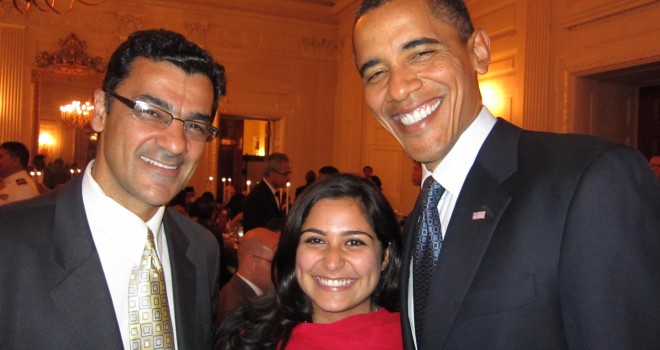
Surveying U.S. and French Muslims
The results of two interesting surveys were released recently: one by the Pew Research Center on U.S. Muslims’ lives and attitudes and one by IFOP (the leading French market research and opinion poll institute) on French Muslims and the evolution of their socio-religious attitudes over the past two decades.
These two Muslim communities are important these days for a variety of reasons — mainly political in the States (with the 10th anniversary of 9/11 and more general considerations) and socio-political in France (with the debates about “national identity,” immigration, integration, etc.). And indeed, one finds the two surveys reflecting those interests very sharply in the questions that were asked. Consequently, the French survey was much more interesting, at least for me, as it explored more the religious attitudes (and their evolution) of the Muslim community there.
Let me now briefly review the main highlights of the two surveys. In the Pew survey of U.S. Muslims, and keeping in mind the strong slant toward political issues,
- 21 percent of the respondents said that there was at least “a fair amount” of support for extremism in their community, whereas 40 percent of the general population believed there is such support among U.S. Muslims;
- 48 percent of the respondents say that their community leaders “have not done enough” in speaking out against extremists;
- 84 percent of the respondents report negative experiences (singled out at airports or by law officers, been called offensive names, etc.) over the past year;
- 56 percent of the respondents say that Muslims who come to the U.S. want to integrate to the American lifestyle, but only 33 percent of the general population believe that to be true. However, when actual lifestyles are examined (watching TV, following football/sports, etc.), no significant differences are found, except perhaps in the displaying of the American flag (44 percent compared to 59 percent in the general population);
- On homosexuality, 45 percent said it should be discouraged by society, while 39 percent said it should be accepted;
- 69 percent of U.S. Muslims said religion was “very important in their lives,” same as U.S. Christians (70 percent);
- 47 percent of Muslims said they attend worship services at least once a week, compared to 45 percent of U.S. Christians.
It should be noted, however, that “attending worship services” is neither a requirement in Muslim religious practice nor an easy possibility for American Muslims (dearth of mosques and difficulty to attend the weekly sermon and prayer, which takes place on Friday in the middle of the day — a time when most people are at work).
The IFOP survey of French Muslims focused much more on socio-religious attitudes and looked for trends between 1989 and 2011.
Contrary to the U.S. survey, the French one first attempted to define the “Muslim” label by dividing “French Muslims” into three sub-groups:
- believing and practicing Muslims (41 percent in 2011)
- believing (but not “practicing”) Muslims (34 percent in 2011)
- of Muslim origin (22 percent in 2011)
It did so by asking respondents to identify themselves as belonging to one of these groups. It later correlated this self-labeling with the practices and attitudes that the respondents were asked about and found that “being a practicing Muslim” correlates most strongly with two practices: praying each day and going to the mosque on Friday. Other practices, e.g. fasting in Ramadan, do not make people declare themselves as “practicing Muslims.”
Here below are the highlights of that survey:
- Praying daily, after dropping from 41 percent to 31 percent between 1989 and 1994, has increased steadily to 39 percent; likewise for going to the mosque on Friday, which has increased to 25 percent, particularly among the youth, increasing from 7 percent to 23 percent. (The report points out that only 5 percent of French Catholics go to church at least once a month.) Another small surprise is that, unlike the case in much of the Muslim world where the Friday prayer at the mosque remains largely a male activity, in France 16 percent of (practicing) Muslim women do that, compared to 35 percent of (practicing) Muslim men.
- Fasting in Ramadan provided another surprise: 71 percent of respondents declared fasting the whole month, with an additional 9 percent doing it “some days.” The percentage of those stating openly that they do not fast has decreased from 32 percent to 20 percent. In France, considering various social factors, this is quite impressive.
- Alcohol drinking has also decreased from 39 percent to 32 percent, with only 22 percent of women, compared to 44 percent of men.
- Women wearing headscarves (the “veil,” as the French refer to it) regularly represent 26 percent of “practicing Muslim women,” with an additional 6 percent doing it sometimes or rarely. The practice is still much stronger among older women.
- The survey asked Muslim women the extent to which they would accept seeing their daughters marry a non-Muslim man (a practice that is forbidden by religious law). Predictably, the answers varied tremendously among those who define themselves as “practicing,” “believing” (but “not practicing”) and “of Muslim origin.” Full acceptance was: 29 percent, 56 percent and 76 percent; with reluctance/unhappiness was 27 percent, 30 percent and 17 percent, respectively.
- On homosexuality, likewise, one finds a large spectrum of views, largely correlating with the religious adherence of the individual: acceptance was 23 percent, 42 percent and 66 percent among the “practicing,” “believing” and “of Muslim origin,” respectively; rejection was 77 percent, 52 percent and 29 percent.
I’ll be very interested in readers’ comments (from everywhere).
By Nidhal Guessoum, published in The Huffington Post, September 21st 2011.

